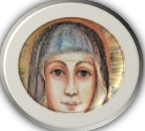
Genesis 24:34-38, 42-49, 58-67
The way this story pans out it is almost like a Play – a drama: Its characters are Abraham, Isaac, Eliezer, Rebekah, and her family which consisted of Bethuel and her mother, then there is Laban who will feature in later episodes.
In Act one: – Abraham has Eliezer swear fealty to him, similar to loyalty except that loyalty is a bi-product of Philadelphia or philia and fealty is a Mitzvah or command. when put another way Abraham commands Eliezer to demonstrate Chesed by completing his given mission to find Isaac a wife from among Abraham’s Family. Eliezer places his hand beneath Abraham’s thigh, to demonstrate submission, to swear his fealty
Depart Eliezer, stage left with ten camels and gifts of jewelry for Isaac’s future wife. He travels to Aram Naharaim where Bethuel is ruler.
Act two: At the well in Aram Naharaim Eliezer ponders how to identify the one who will be a suitable wife for Isaac. She must be one who readily demonstrates Chesed. She must also be the kind of person who readily perform God’s will without considering it credit for a deed well done.
Eliezer decides on what the Jewish People like to call the “Camel Test” and goes further by praying to “The God of my Master, Abraham”
Eliezer exclaims “I was so excited to see God’s plan for my master’s son succeed. I asked God, ‘Please show me the right woman for him. I’m here at the spring. When a girl comes to get water, I’ll ask her for a drink. If she says, “Sure, and I’ll also water your camels,” let her be the one you have picked for him.’ And guess what? God answered my prayer right away!
Rebecca’s kindness amazed Eliezer. She didn’t just pass his test, she aced it. She watered all his camels without complaining or expecting anything. She showed her true character in her everyday actions. Eliezer watched her carefully and knew she was the one. The “camel test” revealed Rebecca’s greatness.
Eliezer: I was so excited to meet her, -I couldn’t help but ask, ‘Who are you related to?’
Rebekah said, ‘I’m Bethuel’s daughter, Nahor and Milcah’s granddaughter.’ (Abraham’s great-niece)
Eliezer: – I gave her the ring and the bracelets right away. Then I bowed down and thanked the Lord. He is the God of my master Abraham. He guided me to find the perfect match for his son among his kin. Now please tell me, will you be kind to my master and let this happen?’
Act Three – Enter Laban stage front:
Rebekah was so excited that she rushed to tell her mother’s family what had happened. Her brother Laban heard her story and saw the jewellery she was wearing. He ran to the spring where Eliezer was waiting with his camels. He greeted him warmly.,
Laban: – “You are welcome here, you who are blessed by the Lord. Why are you still outside? I have prepared the house and a spot for your camels.”
Eliezer explains – I was so happy when Sarah, my master’s wife, had a son in her old age. My Master – Abraham said sGo to my family’s house and my relatives and choose a wife for my son there.’ Now please! Rebekah must come with me now – while my master is still alive.
Rebekah agreed to go with him right away. They sent her off with her nurse and Eliezer and his men.
They blessed Rebekah and said:
“May you, our sister, have many thousands of children. May your descendants conquer their enemies’ lands.”
Rebekah and her maids got on the camels and followed Eliezer.
Act Four: -Isaac and Rebekah are Married
Isaac returned from Beer Lahai Roi and settled in the Negev. One evening, he when went out to the field to meditate. He saw camels approaching. Rebekah saw Isaac and got off her camel.,
Rebekah “Eliezer -Who is that man walking in the field to greet us?”
Eliezer replies “He is my master,”. Rebekah veils herself. The servant tells Isaac all he had done. Isaac brought her to his mother Sarah’s tent. He marries Rebekah and loves her.
Isaac: – My mother – Sarah is dead, but I have now found comfort.
The end – for now.
In perspective when read as a spiritual manual rather than as a physical, historical narrative, the Torah exposes its most profound insights. The lives of its heroes are meant to inform our lives here in the present, not some far past; any historical lessons we learn from studying the Torah are secondary in value. Rather than “history” or even “law,” the word “Torah” is translated as “teaching” or “guidance.”
Lightstone, S. (n.d.). An image of a Camel drinking from a water pot. [Illustration] Available at: https://w2.chabad.org/media/images/918/Kwrv9184023.jpg?_i=_nF2BB495DED96754E4660F69A3A9F4712 [Accessed 15 Jul. 2023]. Illustration by Sefira Lightstone for an article A Lesson in Giving By Esther Vilenkin .


